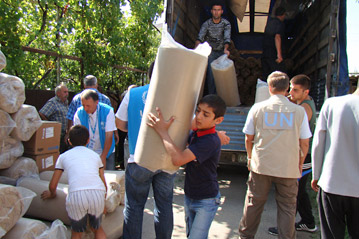Displaced meet in Gori as they flee new violence or try to head home
Displaced meet in Gori as they flee new violence or try to head home

GORI, Georgia, August 27 (UNHCR) - People escaping a buffer zone between Georgia and the breakaway South Ossetia region, and others heading the other way and trying to return to their villages in the volatile area, are flocking to the Georgian town of Gori.
By late afternoon on Wednesday, 1,212 people from villages in the 26-kilometre-wide buffer zone separating Gori and South Ossetia had registered with local authorities in Gori as internally displaced. They included the newly displaced as well as people who fled to the Tbilisi area after the recent conflict over South Ossetia erupted on August 8.
The latter want to return to their villages, but have been unable to move beyond Gori. Some claimed they tried to return, but were stopped at Russian checkpoints and advised not to continue because of widespread lawlessness. Others said they found their houses damaged and so returned to Gori because they felt unsafe.
The newly displaced have been arriving in Gori with similar tales of intimidation, beatings and looting by militias in buffer zone villages such as Khvemo Nikozi, Megvrekesi, Ergneti and Kitsnisi. On Tuesday, a group of displaced villagers said at least three people had been killed, but this could not be independently confirmed.
The UN refugee agency issued a statement on Tuesday calling on all parties to the conflict "to make their best efforts to contain further outbreaks of lawlessness which could contribute to additional displacement." UNHCR specifically expressed concern over reports of displacement caused by marauding militias in the buffer zone.
Most of the villagers now escaping south to Gori said they had stayed put when the conflict broke out earlier this month because they were old and weak. The appearance this week of militias had made them change their minds, but they said they had had to leave the most vulnerable behind.
A 50-year-old farmer asked UNHCR for help in bringing out his octogenarian parents, including a blind father, from one village. Others also sought help in rescuing relatives left behind.
A UNHCR team tried to reach the buffer zone villages on Tuesday, but was turned back at a checkpoint and told that the security situation did not allow for movement in that zone. Representatives of the International Committee for the Red Cross (ICRC) told UNHCR that they had not been able to access the buffer zone for one week.
Meanwhile, the new UNHCR office in Gori - opened on Sunday - has been helping the newly displaced from the buffer zone and the growing number of people returning from areas in and around the Georgian capital of Tbilisi since the weekend.
Tsiala, a 75-year-old woman from the buffer zone village of Ergneti, queued with some 200 other people in Gori's main square on Tuesday to be registered as an internally displaced person (IDP). She told UNHCR staff that she feared she would have to spend another night in the open after walking here on Monday.
To help people like Tsiala, UNHCR on Tuesday erected 100 family tents on a football field on the outskirts of Gori. Others have rushed to help: France provided an extra 63 large tents, while the Italian Red Cross pledged to deliver a kitchen.
One of the tents was soon occupied by a group of returnees from Tbilisi, who had hoped to return to their homes in the buffer zone. "We have nothing but the clothes we are wearing," one of them said, while another worried about the livestock on her farm after hearing unconfirmed reports of cattle rustling by the militias.
Many Gori locals have also returned - between 10,000 and 15,000 out of a peacetime population of some 70,000, according to the Georgian government.
UNHCR was also on Tuesday preparing to send non-food items such as blankets, kitchen sets and jerry cans to a temporary warehouse set up in Gori on Sunday. The municipal authorities, meanwhile, were using 17 kindergartens as collective centres for IDPs.
In addition to providing aid, UNHCR will assist local authorities in mapping and assessing the numbers of returnees to Gori, which was largely abandoned during the conflict earlier this month. UNHCR is also coordinating assistance programmes providing shelter and non-food items as an increasing number of aid organizations arrive in Gori and the Georgia operation enters a post-emergency phase.
More than 158,000 people were displaced during the recent conflict - 128,000 within Georgia and some 30,000 who fled to the Russian Federation. Prior to the latest crisis UNHCR has been working on behalf of some 220,000 previously displaced people, refugees, returnees, asylum seekers and stateless people in Georgia.
By Melita H. Sunjic in Gori, Georgia









